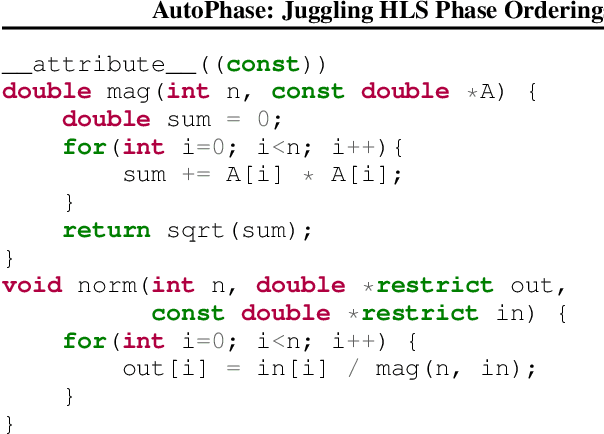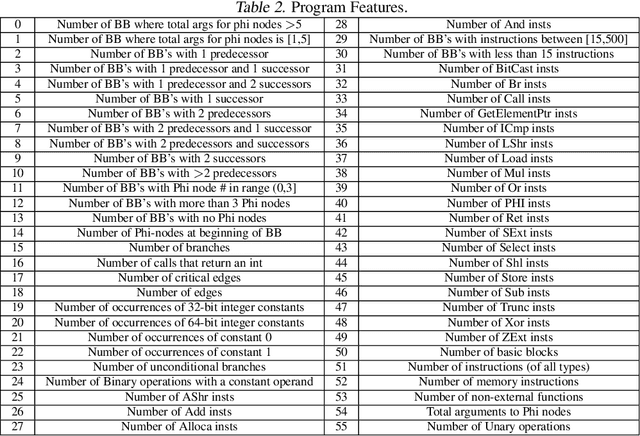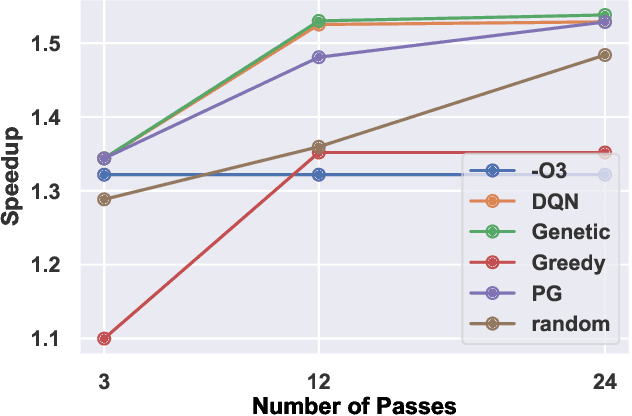John Xiang
AutoPhase: Juggling HLS Phase Orderings in Random Forests with Deep Reinforcement Learning
Mar 04, 2020



Abstract:The performance of the code a compiler generates depends on the order in which it applies the optimization passes. Choosing a good order--often referred to as the phase-ordering problem, is an NP-hard problem. As a result, existing solutions rely on a variety of heuristics. In this paper, we evaluate a new technique to address the phase-ordering problem: deep reinforcement learning. To this end, we implement AutoPhase: a framework that takes a program and uses deep reinforcement learning to find a sequence of compilation passes that minimizes its execution time. Without loss of generality, we construct this framework in the context of the LLVM compiler toolchain and target high-level synthesis programs. We use random forests to quantify the correlation between the effectiveness of a given pass and the program's features. This helps us reduce the search space by avoiding phase orderings that are unlikely to improve the performance of a given program. We compare the performance of AutoPhase to state-of-the-art algorithms that address the phase-ordering problem. In our evaluation, we show that AutoPhase improves circuit performance by 28% when compared to using the -O3 compiler flag, and achieves competitive results compared to the state-of-the-art solutions, while requiring fewer samples. Furthermore, unlike existing state-of-the-art solutions, our deep reinforcement learning solution shows promising result in generalizing to real benchmarks and 12,874 different randomly generated programs, after training on a hundred randomly generated programs.
AutoPhase: Compiler Phase-Ordering for High Level Synthesis with Deep Reinforcement Learning
Jan 15, 2019
Abstract:The performance of the code generated by a compiler depends on the order in which the optimization passes are applied. In the context of high-level synthesis, the quality of the generated circuit relates directly to the code generated by the front-end compiler. Unfortunately, choosing a good order--often referred to as the phase-ordering problem--is an NP-hard problem. As a result, existing solutions rely on a variety of sub-optimal heuristics. In this paper, we evaluate a new technique to address the phase-ordering problem: deep reinforcement learning. To this end, we implement a framework that takes any group of programs and finds a sequence of passes that optimize the performance of these programs. Without loss of generality, we instantiate this framework in the context of an LLVM compiler and target multiple High-Level Synthesis programs. We compare the performance of deep reinforcement learning to state-of-the-art algorithms that address the phase-ordering problem. Overall, our framework runs one to two orders of magnitude faster than these algorithms, and achieves a 16% improvement in circuit performance over the -O3 compiler flag.
 Add to Chrome
Add to Chrome Add to Firefox
Add to Firefox Add to Edge
Add to Edge